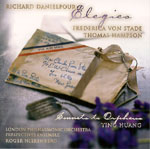Elegies is Frederica von Stade’s tribute to a father she never knew. Charles von Stade wrote many letters to his young wife, pregnant with their first child, before he was killed in action in World War II. The singer had long desired to turn some of the sentiments her father expressed into a song cycle, and eventually the letters were fashioned into poems by Kim Vaeth. Richard Danielpour was commissioned to compose the music in 1997. The five songs form a sort of a conversation across the gulf of time between father and daughter. The text alludes to their separation, longing for each other, and their eventual reconciliation on the spiritual plane. The poetry is a bit high-flown, making it difficult to imagine this being intimate communication between loved ones (loved ones living in the 20th century at any rate), and for this reason I found it at times to be off-putting. However, von Stade sings with much genuine feeling, and she’s joined by Thomas Hampson, also in fine voice, who sounds more self-conscious than necessary.
Danielpour’s music is occasionally morose, at times angry, and seems to use Samuel Barber as a stylistic starting point. The final song, In Paradisum, ends serenely with repeated modulations of sustained chords in an obvious nod to Richard Strauss’ Four Last Songs (composed during World War II). Roger Nierenberg and the London Philharmonic persuasively perform the orchestral accompaniment. In 1991 Danielpour composed setings of six of Rainer Maria Rilke’s Sonnets to Orpheus. Though employing smaller forces (the Perspectives Ensemble, in a spirited performance), the music is actually composed on a larger scale, with much greater stylistic diversity than Elegies. In Sonnet XV, Dance the Orange, Danielpour attempts a strange sort of atonal rock-n’-roll riff that sounds a bit silly on “classical” instruments. However, Rilke’s poetry is aesthetically more palatable than Vaeth’s, and the vocal writing throughout is very effective, giving soprano Ying Huang ample opportunity to display her lovely voice and considerable communicative talents–she keeps you listening. Though Danielpour’s songs don’t approach the level of the composers he emulates, they nevertheless are well crafted, and if you find this kind of neo-romantic, end-of-the-century musical amalgam to be your cup of tea, you shouldn’t be dissatisfied with this disc.
































